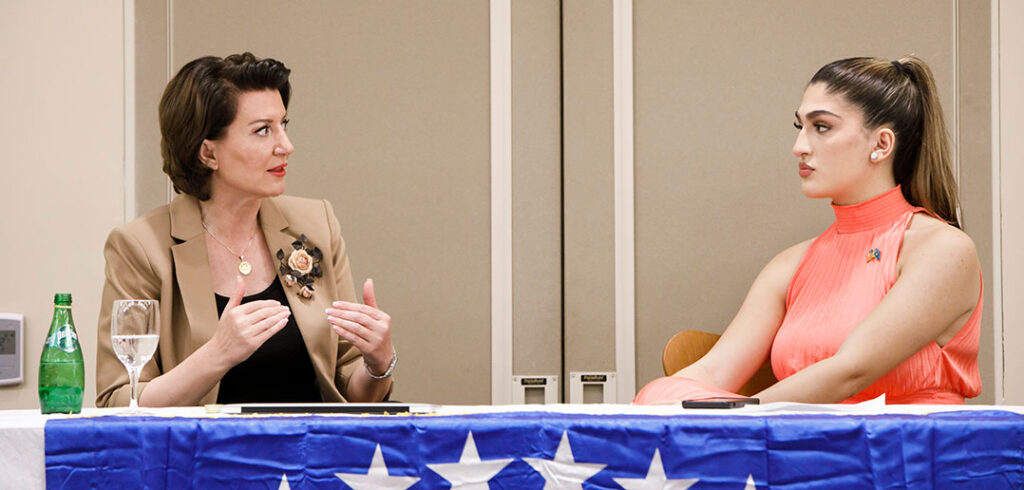Atifete Jahjaga, the first woman president of the Republic of Kosovo, visited Fordham’s Lincoln Center campus on Tuesday, May 3.
Jahjaga, who was elected as the country’s third president in 2011 at age 36, spent two hours sharing with students the lessons she learned from her five years in office, including insights about how society should treat victims of sexual assault.
The topic is one of great importance in Kosovo, which fought a war of independence in 1998 against Serbia and Montenegro—then known together as the Federal Republic of Yugoslavia.
Although great strides have been made to rebuild the physical infrastructure of Kosovo, which was largely destroyed in 16 months of fighting, Jahjaga said the toll on the country’s citizens has lingered. In a nation with 1.8 million citizens, she said, an estimated 13,000 were killed, one million were forced to flee, and an estimated 20,000 men and women were raped.
There still exists what she called a “culture of impunity” for those responsible for war crimes, and she said it’s incumbent on the international community to hold the countries where these criminals live accountable.
“There is a great opportunity at the moment, while all of our countries are aspiring to join the European Union,” she said.
“But there is work that needs to be done.”
Jahjaga said that Kosovars have also had to accept painful truths about how they’ve treated victims of sexual assault. Early on in her presidency, she visited a group of 35 women who had been raped during the war, and the experience left her badly shaken. For 14 years, they had been silenced and blamed for their plight.
“The women were the ones who stayed at home to look after the elderly and the children, without knowing that their bodies would become battlefields,” she said.
“To our shame, we covered them with a veil of shame for 14 years after the war, instead of putting them under a veil of pride, for being the heroes of our war.”
Pushing, as she did when she was president, to establish a national council for the survivors of sexual violence made her very unpopular, she said. But it was absolutely necessary to help the country move forward.
“When I asked, ‘What can I do for you?’ the survivors would say, ‘There’s no money in this world that can repay for what we’ve gone through. We just need recognition that our bodies were turned into battlefields against our will,’” she said.
Jahjaga also said that as the international community faces the fallout from the war in Ukraine, she hopes it will take advantage of the lessons her country has learned when it comes to aiding victims of sexual assault. It is of paramount importance to preserve as much evidence as possible, for instance.
“Now is the time to reach out to us, and other countries with a fresh, institutional memory. The physical evidence will not last more than 48 hours, but other evidence is very important that is going to be valued 10 years, 20 years, 30 years later,” she said.
“The mistakes that we have made in Kosovo and our region, we are willing to pass along to the other countries and international organizations.”
Jahjaga came to Fordham at the invitation of Djellza Pulatani, a sophomore majoring in international studies at Fordham College at Lincoln Center whose parents immigrated from Albania, which borders Kosovo. Pulatani, the incoming president of the United Student Government at Lincoln Center and founder of the committee of sexual misconduct at the Lincoln Center campus, met Jahjag while working on a personal documentary about Kosavar women.
Jahjaga said one of her proudest accomplishments was making a concerted effort to make her cabinet mirror the country as a whole, with 70% of positions occupied by women, and over 50% occupied by people under 30 years old.
“When you have a country where 60% of the population is under the age of 25, we as leaders have to be really careful, especially with our strategies and vision, and what kind of opportunities we’re offering,” she said.
“It has not been an easy path for me to be the first woman president in the country, and to be the youngest one. I’m really happy to step back now and say that Kosovo has elected for the second time a woman president and the third time in the region.”
Her advice to undergraduates was to trust and believe in themselves.
“Don’t ever make any compromise with the values that you stand for, because if you make that compromise, no matter how small, you will never know what you stand for,” she said.

